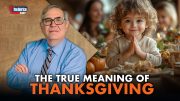
“I’m gay — you have to leave.… Tell all your f****** friends ‘Don’t f****** come here!” So said owner Ben Borgman to a group of Christians in a vulgar rant at his appropriately named Bedlam Coffee shop in Seattle, Washington. The incident, sparked by the Christians’ pro-life activism outside the café (they were in the shop only to drink coffee), was caught on a video that went viral and has, predictably, inspired much analysis. Unfortunately, most of it misses an important distinction.
Unsurprisingly, many commentators have equated Borgman’s blow-up with Christian bakers refusing to provide cakes for faux (“gay”) weddings. After all, the Supreme Court will hear arguments on this very matter in Masterpiece Cakeshop v. Colorado Civil Rights Commission on December 5. As Reason’s Scott Shackford put it, “If a coffee shop owner doesn’t want to serve a group whose positions he finds disagreeable and offensive, is that subtantially [sic] different from a baker refusing to do work for a same-sex marriage he finds offensive?”
Actually, it is.
Don’t misunderstand me, I fully respect in principle freedom of association, which means that both Borgman and the bakers should be allowed to exclude people from their businesses for any reason whatsoever. Nonetheless, there’s a widely ignored distinction here that’s most significant: Borgman (video below) refused to serve a certain class of people.
The Christian bakers have refused to service (as in be party to) a certain class of events.
What would be equivalent in the Christian bakers’ case is if they refused to serve homosexuals, period, or discriminated based on a group’s support for faux marriage. But the Christians in question serve homosexuals all the time.
What would be roughly equivalent in Borgman’s case is if he’d simply refused to service a pro-life event.
Why does this matter? Like it or not (and I don’t), there’s now a long-standing precedent in American law empowering the government to prohibit businesses from discriminating against classes of people. But when before in history has the state ever compelled business owners to service events of any kind, let alone those they found morally objectionable? Is this a bridge we want to cross? Yet we could cross it — without even realizing we’ve done so — because we’ve obscured this obvious distinction between people and events.
Yet there’s even more to it. As legal scholar Jonathan Turley puts it, “I have supported a free speech approach to such cases. I believe that a Jewish cake shop owner should be able to refuse to make a Mein Kampf cake or an African American owner should be able to refuse to make a White Supremacist cake. While they cannot refuse to sell existing cakes, a line can be drawn over expressive acts like the preparation of cakes or work as photographers.”
In other words, bakers invariably are asked to put a message on a wedding cake; in the case of a faux wedding it would be to the effect of, “Best wishes to Bill and Tom.” Moreover, even if the bakers just put two male figurines on the cake, note that the Supreme Court has found that symbolic speech enjoys First Amendment protections. (Note: I don’t agree that the Founders meant for the amendment to cover all sorts of “expression,” such as pornography and flag burning. But that’s a topic for a different day.) And forced speech is not free speech.
Where Turley goes wrong is when he writes that he can see no approach other than the free-speech principle “that can thread this needle” and that the Borgman “case reflects the difficult line drawing [sic] for such cases.”
Actually, it’s not difficult at all. Shackford gets it right here, stating that “it’s more responsible, ethical, and most of all mature to suggest that both the coffee shop owner and the baker should be able to decide for themselves when they’ll extend their hospitality.”
This true respect for freedom of association is rare today even among conservatives. But the argument for it is simple. As I wrote last year:
Think about it: you have a right to include in or exclude from your home whomever you please, for any reason whatsoever, whether it’s because the person is a smoker, non-smoker, black, white, Catholic, Protestant, or because you simply don’t like his face.
Why should you lose this right merely because you erect a few more tables and sell food?
Or because you bake cakes, take pictures, plan weddings or conduct some other kind of commerce?
It’s still your property, paid for with your own money and created by the sweat of your own brow. Is a man’s home not his castle?
It’s not when we accept the judicial fiat stating, unconstitutionally, that privately owned businesses are somehow “public accommodations.”
Note that the Christians Borgman booted — part of a group called Abolish Human Abortion — probably don’t have a viable lawsuit here. Washington law does prohibit discrimination based on religious affiliation. But it doesn’t prohibit same based on political belief, and Borgman can claim that his actions were sparked only by the Christians’ pro-life activism.
And that’s what happens when we empower the government to discriminate among types of discrimination: Some discriminators will always be more equal than others.



